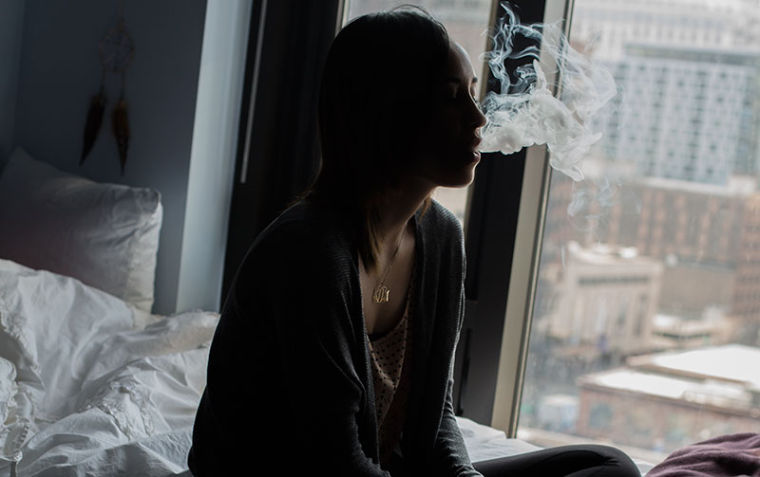Students get high in highrise
Photo Illustration by Carolina Sanchez
According to Mary Oakes, director of Residence Life, students who are found in possession of marijuana in residence halls are required to go through a judicial process that could ban students from living in residence halls.
April 21, 2014
As at any other college, getting a whiff of marijuana while strolling through the hallways of any Columbia residence building is common, recurring and generally expected.
When students do not effectively air out their rooms, exhale through a dryer sheet or construct a well-planned flow, the resident assistants often put out their spark before they can roll another joint.
Jason Radford, a 2013 art + design alumnus, was caught smoking marijuana in the dorms during his freshman year while he was living in the Residence Center, 731 S. Plymouth Court.
“I had just moved in and I was making good friends with the people across the hall,” Radford said. “We would usually leave the dorms to smoke, but sometimes we would do it inside because it was cold and we were lazy and things like that.”
Radford said RAs knocked on his door because the distinct odor of weed was lingering in the hallway outside his room, where he and 10 other students were smoking. He said the RAs insisted that the students open the door immediately, causing the newbie residents to tweak.
“We got the classic knock on the door and we hid everything,’” Radford said. “It took a few minutes, so they were probably pretty suspicious right off the bat.”
Radford said the RAs searched the room for marijuana and paraphernalia and eventually told the residents to cough up the cannabis. He said the RAs could not physically touch the paraphernalia because of Residence Life restrictions, but they did force him to smash his glass pipe and dispose of it.
Despite the disappointment of having to surrender his piece, Radford said he was relieved that consequences were not harsh.
However, Radford said the punishment was more severe when he was caught a second time. He said he had to meet with a staff member from the Residence Life Office, complete an online course about the effects of marijuana and alcohol and turn in a certificate of completion to Residence Life.
“I thought [the consequences] were kind of a joke compared to how much the RAs used to intimidate us,” Radford said. “They tried to guilt us into not using substances in the dorms just because that meant more work for them.”
Smoking marijuana was a regular pastime for Megan Harrison, a freshman dance major, and her suitemate Shelby Jones, a freshman interactive arts & media major, until they got caught in October by their RAs at the University Center, 525 S. State St. Harrison said she and Jones were smoking in Jones’ room on a Sunday night. They tried to ventilate the smell of marijuana, but they were unsuccessful.
“We got a knock on the door and saw it was an RA,” Harrison said. “Because I answered my door, they wanted to search my room because it smelled like pot.”
Harrison was forced to let the RAs search her room too, even though she had been smoking in Jones’ room. Harrison said she came forward with her bowl and torch lighter for fear of receiving further consequences if she was caught lying to the RAs.
“When the RAs came, there was no physical weed in [Harrison’s] room,” Jones said. “It was just her bowls and pieces. The weed was in my room, but it didn’t smell … so they searched her room and she was the only one who got caught.”
Despite being put on probation for 15 weeks, Harrison said she did not think the consequences were very harsh because the probation did not remove her resident rights. Harrison said the probation sentence essentially warned that there would be more stringent consequences if she was caught violating the policy again.
Mary Oakes, director of Residence Life, said in an emailed statement to The Chronicle that if students are found in possession of marijuana in the residence halls, they are required to go through a judicial process that determines their consequences. Oakes added that it is possible to be banned from living in or even visiting the residence halls if Residence Life decides it is warranted.
David Keys, coordinator of Residence Life Community Development, did not respond to requests for comment as of press time.
Kelli Collins, associate director of Residence Life, declined to comment on the issue.
According to the 2013 Annual Crime Statistics & Fire Safety Report, there was an 18 percent decrease in the number of drug-related disciplinary referrals from 2011–2012. The report showed that there were 176 referrals in 2011, but the number of referrals dropped to 144 in 2012.
Despite the decrease in reported marijuana usage in residence halls, it remains a trend.








